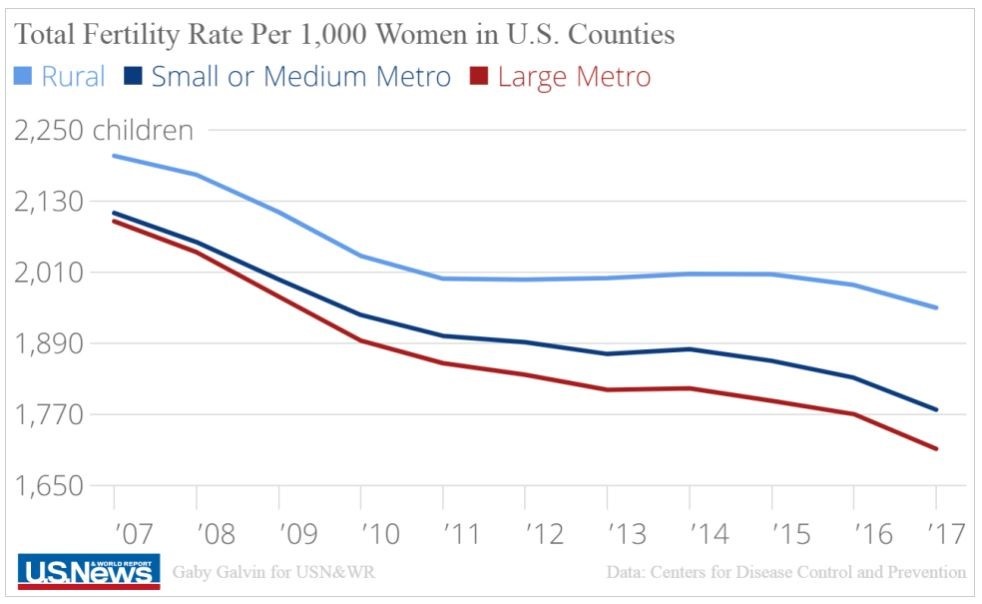
Takeaway: If you’re having trouble getting pregnant, don’t wait. See a Reproductive Endocrinology and Infertility Specialist!
According to a report from the CDC covered in U.S. News & World Report last week (10/16/2018), fertility rates are declining all over the United States. But location matters, too! When these data are looked at more closely, it is apparent that those living in urban environments have lower fertility rates than those living in rural areas. Total fertility rates are estimated by the number of lifetime births per thousand women. In large metro areas the total fertility rate dropped by 18% over the last decade, versus a 16% drop for women living in rural areas.

Even back in the 1950’s there were differences in fertility rates between urban and rural areas. Originally, the expectation was that this gap would close. It is not closing and appears to be widening.
We do not know why fertility rates decline in urban areas more than rural areas. Are there more pollutants? Are there other risk factors? Perhaps there are more pressures in urban areas: more expenses, more time spent at work or commuting, or other lifestyle factors that may encourage women to delay childbearing.
It’s also worth noting that although rural areas have better fertility rates, they also have worse birth outcomes. Rural areas often have fewer subspecialty resources which are important if there is a complication of pregnancy or delivery, and some of these complications come up unexpectedly and emergently. In addition, there is a reduction in hospitals that perform obstetrics services in the rural areas. This number has decreased from 54% in 2004 to 46% in 2014. So it is important to plan where to deliver early in the pregnancy.
These reduced fertility rate findings are straight data and do not look into the specific causes of reduced fertility. The data does reveal the increase in age of women conceiving their first born no matter where they live.
The average age of women conceiving is older overall and higher in urban areas. The average age for women having their first child in large metro counties was 27.7 years old, in small to medium metro counties was 25.8 years old, and in rural counties, 24.5 years old. Starting families at an older age will also decrease pregnancy rates.
Fertility is often taken for granted. Many couples assume that they can get pregnant anytime between puberty and menopause. This is simply not true. Many women wait to start families until they have a well-established career and then, when they have trouble getting pregnant, they wish they had known the truth about age. Since a 1982 study in the New England Journal of Medicine, we have known that fertility rates decrease beginning at age 27, with a significant drop after age 35 and severe drops after age 40.
Age of the female partner is the number one factor when discussing prognosis in infertility treatments. The current recommendation is try to conceive for one year if you are less than 35 years of age and have regular periods and no known cause of infertility. If you are 35 years or older, then you should only try for six months prior to seeing a specialist in Reproductive Endocrinology and Infertility.
If you're in the Chicagoland area and you're concerned about your chances at conception, we at InVia Fertility Specialists are ready to help. Click below to schedule your first appointment online!

Dr. Elizabeth Puscheck is a nationally recognized Reproductive Endocrinology and Infertility (REI) specialist and board certified in both REI and Obstetrics and Gynecology. Her expertise expands beyond these areas to include gynecologic ultrasound where she has been active in writing/revising the national practice guidelines. In addition she has taught numerous symposia and workshops throughout the country for American Society of Reproductive Medicine, American Institute of Ultrasound in Medicine and the American College of Obstetrics and Gynecology and authored over 100 manuscripts, reviews, chapters, and books. She is active in a number of clinical trials regarding new drugs and devices dedicated to improve our medical care. Her passions include providing the best clinical care for her infertility patients. She is proud to be a member of the InVia Fertility Specialists team, and is ready to work with parents of all backgrounds to achieve a healthy pregnancy.
Subscribe to our weekly blog digest

Entire Website © 2003 - 2020
Karande and Associates d/b/a InVia
Fertility Specialists

Comments